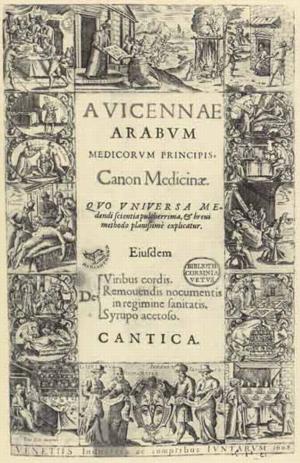Abu Ali al-Husayn ibn 'Abd Allah ibn Sina (Latin: Avicenna
Persian physician and philosopher, b. 980 (Bukhara, Iran), d. 1037 (Hamadan).
 Ibn Sina, known throughout the world under his Latinized name Avicenna, was the son of a Persian family whose home was a meeting place for scholars. An unusually gifted child with an exceptional memory, Avicenna listened in to the discussions and was formally taught by his father.
Ibn Sina, known throughout the world under his Latinized name Avicenna, was the son of a Persian family whose home was a meeting place for scholars. An unusually gifted child with an exceptional memory, Avicenna listened in to the discussions and was formally taught by his father.
At the age of 10 Avicenna had already memorized the Qu'ran and much Arabic poetry and turned to logic and metaphysics. He soon surpassed his teachers and studied on his own. By the age of 18 he had more or less mastered Islamic law, medicine and metaphysics.
Avicenna's reputation as a physician brought him access to the court of the Samanids, the first Persian dynasty in the Arabian empire. He treated and cured the prince and from then on was given the use of the Samanid library.
During Avicenna's lifetime the Arabian empire suffered much from political instability. Persian and Turkish houses competed for power, and local houses took advantage of the situation by establishing independent rule. Shortly after the death of Avicenna's father the Samanids were deposed by the Turkish Ghaznavids.
Throughout the rest of his life Avicenna moved from one city to another, sometimes in search for better employment, often fleeing from persecution. Wherever he went his talents as a physician and as an administrator were in great demand. Twice Avicenna was appointed vizier (chief minister), a position that exposed him to court intrigue and persecution. Avicenna was forced to hide for periods, and at one time he was imprisoned.
Given his circumstances, Avicenna's achievements as a scientist and philosopher are without parallel. He began writing his two most famous works, the Kitab ash-shifa ("Book of Healing") and the al-Qanun fi at-tibb ("Canon of Medicine"), during his stay in prison. The caliphs of the period were only interested in his services as court physician and administrator, and Avicenna had to continue work on his books at night. Fortunately he had a robust constitution, and work progressed well during the hours of the night in the company of his students, interrupted now and then by musical entertainment and partying.
In 1022 Avicenna had to flee again and settled in Isfahan, where the last 14 years of his life brought him relative peace and allowed him to complete his works and write another nearly 120 treatises. He nevertheless had to serve as physician during military campaigns. He fell ill during one such campaign and died from colic and exhaustion.
Among Avicenna's major works are:
- The Kitab ash-shifa ("Book of Healing"), probably the largest work of its kind written by on person, is an encyclopaedia of knowledge that covers logic, the natural sciences, the quadrivium (geometry, astronomy, arithmetic, music), psychology and metaphysics. It shows Avicenna as the philosopher-scientist of the Greek tradition, for whom scientific study is embedded in philosophy. Avicenna's philosophy is formulated in an Islamic framework and therefore based on the notion of the one God, but he avoids the discussion of ethics and politics.
- The al-Qanun fi at-tibb ("Canon of Medicine"), the most famous book in the history of medicine of all civilizations, is an encyclopaedia of all medical knowledge of the time. It was translated into Latin in the 12th century and established Avicenna's fame in the European civilization.
- The Kitab an-najat ("Book of Salvation"), written partly in the field during a military campaign, is a masterful summary of Avicenna's philosophical thought outlined in the Book of Healing.
- The Kitab al-isharat wa at-tanbihat ("Book of Directives and Remarks") is Avicenna's testimony; it shows the development of his personal thought and philosophy in the direction of Islamic mysticism, from the first growth of faith to uninterrupted vision of God.
- The Lisan al-'arab ("The Arabic Language"), Avicenna's answer to criticism that he did not master the Arabic language properly, did not get beyond the stage of a rough draft.
In the history of medicine Ibn Sina holds a place of honour next to Hippocrates and Galen. Although his name is no longer remembered by people outside the Islamic world, in Muslim countries he is rightly held in the high regard he deserves.
Reference
Seyyed Hossein Nasr (1994) Avicenna. Encyclopaedia Britannica 15th edition.
The illustration below shows the frontispiece of the Latin edition of the Canon of Medicine.

home
 Ibn Sina, known throughout the world under his Latinized name Avicenna, was the son of a Persian family whose home was a meeting place for scholars. An unusually gifted child with an exceptional memory, Avicenna listened in to the discussions and was formally taught by his father.
Ibn Sina, known throughout the world under his Latinized name Avicenna, was the son of a Persian family whose home was a meeting place for scholars. An unusually gifted child with an exceptional memory, Avicenna listened in to the discussions and was formally taught by his father.